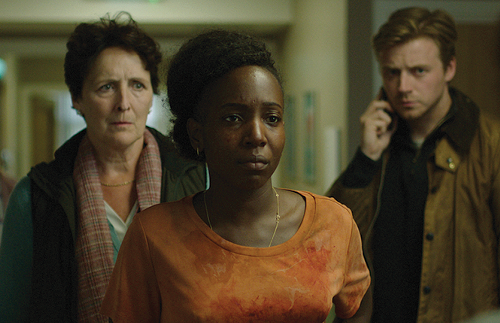The Parent, Trapped
Kindred literalizes the terror of having no choice in having a child.
By Scott Renshaw @scottrenshawIt's kind of embarrassing the extent to which we have allowed scary movies to become a bastard genre. Sure, there's plenty of bad horror; the fact that it's so often cheap to produce makes it easy for a lot of crap to ooze into the marketplace. But there's also plenty of bad comedy, bad drama, bad historical romance, etc., and horror too rarely gets credit for the way it allows us to process the world's most potent anxieties. Technology, the natural world, surviving abuse, the death of someone close to us—anything frightening can be (and has been) turned into potent metaphorical material in storytelling.
Co-writer/director Joe Marcantonio's debut feature Kindred takes on a subject tailor-made for such an approach: the many terrors of incipient parenthood. At the outset, Charlotte (Tamara Lawrence) and her boyfriend Ben (Edward Holcroft) are preparing to move from England to Australia—a decision that appears unacceptable to Ben's wealthy mother, Margaret (Fiona Shaw). It grows even more unacceptable when Charlotte discovers that she's pregnant, and that this development isn't going to change their plans.
What does change those plans rather dramatically is veterinarian Ben's death when he's kicked by a horse. And while Charlotte is left unsure what she should do next—including whether she should keep the baby at all—Margaret and her stepson from her second marriage, Thomas (Jack Lowden), seem quite certain that what is best for Charlotte and the baby is keeping her at their estate house, whether she likes it or not.
What follows is a very slow build in tension, as it becomes increasingly clear that Margaret and Thomas don't necessarily have Charlotte's best interests at heart. Marcantonio does a solid job of directing with an emphasis on disorientation and unease rather than jump scares, including a shot of Charlotte lying on a floor that turns her over to make it look like she's on the ceiling, and a moment of betrayal that plays out entirely without audible dialogue even as we share Charlotte's sinking realization of what is happening.
But Kindred ultimately proves most effective at building multiple layers of meaning into Charlotte's sense that the circumstances of her pregnancy are beyond her control. Marcantonio and co-screenwriter Jason McColgan hint at mental health issues that plagued Charlotte's own mother, which left Charlotte with the feeling that she has no role model for how to be a mother. Questions of capable parenting permeate the narrative, including monologues by Shaw and Lowden (both of whom deliver terrifically creepy performances) about realizations that occurred during pivotal moments. When so many of us have terrible parents, or admit to having no idea what we're doing, why would Charlotte not be terrified?
Perhaps the most unsettling notion in Kindred, however, is the reality that Charlotte's agency in her reproductive decision is being taken away from her because of other people who think they know what's best—and specifically, as they usually phrase it, what's best "for the baby," as though she exists as nothing but a gestational vessel. There's a jagged sense here of the passage of time, as though the grieving Charlotte, despite her voiced reservations about having the baby, is kept passive and docile until it's too late to make any other choice. Like other horror tales built around motherhood—Rosemary's Baby comes most immediately to mind—the idea that a pregnant woman's thoughts can be dismissed as irrational weaves its way into a story that literalizes a pregnant woman being denied the opportunity to make her own choices. Also, it seems more than incidental that Charlotte is a woman of color, being manipulated by wealthy white people.
Marcantonio introduces a vague sense of the supernatural into Kindred, in the form of crows that appear both in Charlotte's nightmares and at various moments of crisis. There's never really a satisfying payoff for that setup, nor does the film seem particularly interested in a gut punch of an answer for why Margaret and Thomas act the way they do. Yet Kindred works as a kind of conspiracy thriller where the conspiracy is a world that refuses to allow you a sense of bodily autonomy. When the real world offers such scary prospects, a movie can give you an unnerving way to process them.
More by Scott Renshaw
-
Feature film review: THE BEAST
A filmmaker's compelling ideas get a bit tangled in references to his creative influences.
- Apr 17, 2024
-
Faces of Salt Lake County book and portrait reception
Images and personal stories in a new book reveal local demographic diversity
- Apr 17, 2024
-
Film Reviews: New Releases for April 12
Civil War, Escape from Germany, Coup de Chance, Hundreds of Beavers, La Chimera, Sting
- Apr 11, 2024
- More »
Latest in Film Reviews
Readers also liked…
-
Power Plays
Two satirical comedies explore manipulations and self-delusions by those with power.
- Aug 31, 2022




